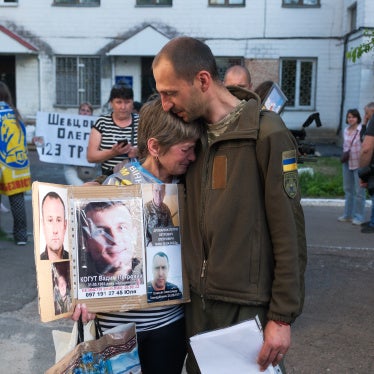(Moscow, November 1, 2011) – Belarusian authorities should dismiss criminal charges against a leading human rights defender, Ales Bialiatski, and release him immediately from custody, Human Rights Watch said today. Bialiatski’s trial is scheduled to begin on November 2, 2011, in Minsk.
Bialiatski, the head of Viasna Human Rights Center, is facing charges of large-scale tax evasion, which carries a maximum sentence of seven years in prison and confiscation of all property.
“For over 16 years, the government of Belarus has continuously tightened control over civil society,” said Hugh Williamson, Europe and Central Asia director at Human Rights Watch. “By prosecuting Bialiatski the authorities are trying to finally slam the door shut on human rights work in Belarus.”
The criminal charges stem from Bialiatski’s use of his personal bank accounts in Lithuania and Poland to receive funding from international donors in support of human rights work in Belarus – in particular for legal and financial assistance to political prisoners and their families after the December 2010 pro-democracy protests in Belarus. Following Bialiatski’s arrest on August 4, the authorities denied his lawyer’s request for pretrial release and remanded Bialiatski to custody.
On October 19, Bialiatski’s deputy, Valentin Stephanovich, was found guilty on misdemeanor charges of not fully declaring his taxable income and was required to pay a fine of 47 million Belarusian rubles (about US$5,500). The charges against him also stemmed from using a foreign bank account to pay for human rights work in Belarus.
For years, the Belarusian authorities have used various pretexts to refuse national registration to all but one independent human rights organization. As a result, unregistered groups like Viasna cannot open a bank account in the organization’s name in Belarus or comply with its financial regulations, Human Rights Watch said.
“For almost two decades the Belarusian authorities have created obstacles to prevent human rights groups from doing their work,” Williamson said. “As a result, human rights defenders like Bialiatski are being forced into a legal grey area that the government exploits to punish them. In reality, what happened to Ales Bialiatski is pure entrapment.”
Human Rights Watch said that following over a decade of stifled civil freedoms, Belarusian civil society activists and human rights defenders face unprecedented levels of repression in the wake of the 2010 post-election protests. The authorities routinely harass participants in silent protests, have stripped seven human rights lawyers of their license to practice law, and expelled or banned from entering the country at least 13 foreign human rights activists.
In October, both chambers of the Belarusian parliament swiftly adopted amendments to a number of laws. Those amendments explicitly prohibit Belarusian nongovernmental organizations from keeping funds on the territory of a foreign state and introduce additional restrictions for groups that receive funding from abroad. The amendments also further restrict freedom of assembly by complicating the procedure for obtaining permits for public gatherings and limiting places where such gatherings may be held. In addition, actions directed at spreading or sharing information about a planned gathering may constitute an offense unless the gathering had already been approved by the authorities.
On October 28, Belarusian authorities sent an invitation to the United Nations high commissioner for human rights, Navanethem Pillay, to visit the country.
“The invitation to the high commissioner to visit Belarus is a positive step, but should not divert attention from the continued lack of cooperation with the UN human rights monitors who have requested access,” Williamson said. “If the Belarusian authorities really want to demonstrate their commitment to upholding human rights and the rule of law, their first step should be to release Ales Bialiatski and drop all charges against him.”






